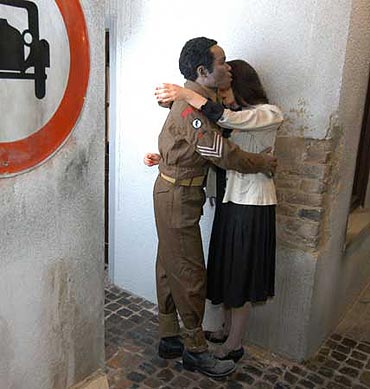Schrift: größer/kleiner
Inhaltsverzeichnis
Sie sind hier: WirRheinländer > english version > The Exhibition > Scenes > Street scene – 1946
Street scene – 1946

In contrast to the German population, the occupying soldiers were well supplied with all essential goods. In addition to provisions, they also received cigarettes, chocolate and other luxury items. Nearly every kind of merchandise could be bought on the black market in exchange for "hard currency" or bartered. Foreign cigarettes constituted a parallel currency. Whoever owned American cigarettes could get butter and bread. Many citizens took part in this kind of business in order to survive. The black market disappeared in 1948 with currency reform.
The occupying soldiers were separated from their families for a long time, so it was no wonder that there was contact between them and German women.
The chronicle of the district of Dahlem reports:
"The supply of food, clothing and everyday commodities went from bad to worse up until the currency reform of 1948. Although money had an official value, in practice it was worthless. On the black market a pound of butter cost 300 Reichsmarks. Take it or leave it?"
(Arntz, Hans-Dieter: Kriegsende 1944/45 im Altkreis Schleiden, Euskirchen 1995, S.298.)


